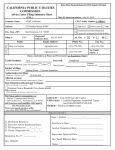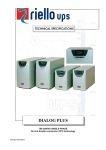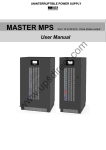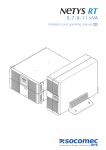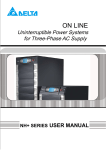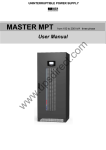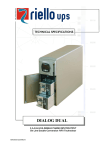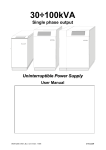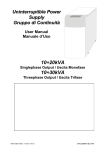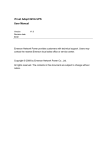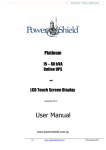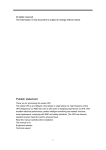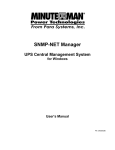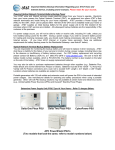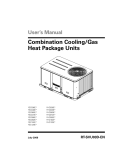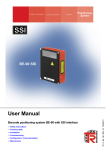Download User Manual – Parallel Operation
Transcript
INTRODUCTION Thank you for choosing our product. Our company is highly specialised in the development and production of uninterruptible power supplies (UPS). The device described in this manual is a high quality product that has been carefully designed and manufactured to guarantee optimal performance. This manual contains detailed instructions for product use and installation. This manual must be stored in a safe place and CONSULTED BEFORE DEVICE USE for proper usage instructions as well as maximum performance from the device itself. NOTE: Some images contained in this document are for information purposes only and may not faithfully demonstrate the parts of the product they represent. ENVIRONMENTAL PROTECTION Our company devotes abundant resources for analysing environmental aspects in the development of its products. All our products pursue the objectives defined in the environmental management system developed by the company in compliance with applicable standards. Hazardous materials such as CFCs, HCFCs or asbestos have not been used in this product. When evaluating packaging, the choice of material has been made favouring recyclable materials. Please separate the different material of which the packaging is made and dispose of all material in compliance with applicable standards in the country in which the product is used. DISPOSING OF THE PRODUCT The device contains internal material which (in case of dismantling/disposal) are considered TOXIC, such as electronic circuit boards. Treat these materials according to the laws in force, contacting qualified centres. Proper disposal contributes to respect for the environment and human health. SAFETY This part of the manual contains SAFETY precautions that must be followed scrupulously. © The device has been designed for professional use and is therefore not suitable for use in the home. The device has been designed to operate only in closed environments. It should be installed in rooms where there are no inflammable liquids, gas or other harmful substances. Take care that no water or liquids and/or foreign bodies fall into the device. In the event of a fault and/or impaired operation of the device, do not attempt to repair it but contact the authorized service centre. The device must be used exclusively for the purpose for which it was designed. Any other use is to be considered improper and as such dangerous. The manufacturer declines all responsibility for damage caused by improper, wrong and unreasonable use. The reproduction of any part of this manual, even in part, is prohibited unless authorised by the Manufacturer. The manufacturer reserves the right to change the product described at any time without prior notice for improvement purposes. CONTENTS INTRODUCTION 15 INSTALLATION 15 PARALLEL CARD ASSEMBLY PROCEDURE 15 SIGNAL CONNECTION 17 UPS AC INPUT / OUTPUT POWER CONNECTION 18 POWER CONNECTIONS “BATTERY” SIDE 20 INITIAL START-UP 21 INVERTER OPERATION AND CONNECTIONS CHECKS 21 BYPASS OPERATION CHECK 22 MANUAL BYPASS FOR MAINTENANCE 22 INTRODUCTION UPSs can be connected in parallel to increase both load reliability and available output power. Up to 2 UPS units with the same power, can be connected together in parallel. The load applied to a multi-unit system in parallel can be greater than that sustainable by each single unit thanks to automatic power distribution. Increased reliability can be obtained only on condition that the total power of the system with a deactivated unit remains greater than that requested. This condition is obtained by always adding a redundant unit. The redundant unit is created by adding one UPS more than the minimum number of elements required to feed the load so that, when a failing unit is automatically excluded, the correct supply continues uninterrupted. UPSs connected in parallel are coordinated through a card that allows information interchange. Information is exchanged between UPSs through a cable connecting them in ring form. This ring connection supplies a redundancy in the connecting cable, thus increasing system reliability. ALL OPERATIONS DESCRIBED IN THIS MANUAL MUST BE PERFORMED BY QUALIFIED PERSONNEL ONLY. Our Company assumes no liability for damages caused by incorrect connections or operations not contained in this manual. INSTALLATION PARALLEL CARD ASSEMBLY PROCEDURE The parallel card can only be installed with UPS completely switched off and with disconnector switches (SWIN and SWOUT) open. 1. Remove the “Parallel cover 1”, unscrewing the two screws from its slot at the back of UPS and cut the band around the flat cable. Note: please, make sure that the flat cable could not drop into the case. 2. Pull out the cable, taking care not to damage the cable’s protective covering. 3. Connect the flat cable to parallel card. Then insert the parallel card sub-assembly into the parallel slot on the rear panel. Please, pay attention to the card orientation. 15 4. Fasten 2 pcs M3 screw to fix the parallel card as shown in the following picture. 16 SIGNAL CONNECTION To perform the signal connection, follow the indications below. Use the Parallel cables supplied only. The signal connection must remain there even after switching off one or more UPSs. The system cannot be switched on without the ring closure connection. 1. Connect one of the parallel cable supplied to the COM1 of UPS1 and to the COM2 of the UPS2. 2. Connect one the other parallel cable supplied to the COM2 of UPS1 and to the COM1 of the UPS2. 3. After installing the two parallel cards with the respective cables, install 2 pcs “Parallel cover 2” to protect the parallel cable, and fix the covers by 4 pcs M3 screw as shown in the picture. 17 UPS AC INPUT / OUTPUT POWER CONNECTION In order to choose the cable section for each ups, refer to the chapter in the user manual entitled “Cables section”. Connect the power cables L1, (L2, L3 if presents) and N to the input terminals L1, (L2, L3 if presents) and N of each UPS. Connect the load cables L1 and N to the output terminals L1 and N of each UPS. Input terminal boards IN Output terminal boards OUT Input cables lenght a1, a2 Output cables lenght c1, c2 When connecting power to UPSs the instructions below must be followed to ensure a good load share when operating from bypass: Example of parallel connection of two units SPM 6 18 Supply cable lengths must be equal: a1 = a2. Output cable lengths must be equal: c1 = c2. SPH 8-20, 10 ER, 20 ER (SINGLE-PHASE INPUT) SPH 8-20, 10 ER, 20 ER (THREE-PHASE INPUT) 19 MAGNETO-THERMAL SWITCHES: To prevent a system failure from impacting on all of the machines present, it is essential that the input of each UPS be protected by a completely independent magneto-thermal switch which is installed upstream of the machine (for rating of the switches, see the indications of the UPS manual in the section “PROTECTION DEVICES”). DIFFERENTIAL SWITCH: To avoid false alarms, when there are various machines in parallel, one single differential switch upstream of the entire system must be inserted as indicated in figure B. Fig. A Fig. B POWER CONNECTIONS “BATTERY” SIDE SEPARATE BATTERIES Each UPS is supplied by its own battery. Note: a different connection may damage the UPSs. 20 BAT BAT UPS 1 UPS 2 OUT OUT INITIAL START-UP CAUTION: when operating SWMB follow these instructions: SWMB must not be closed on a switched off UPS that is in parallel with other units operating normally. This action might damage the UPSs and/or create dangerous voltage at the output. INVERTER OPERATION AND CONNECTIONS CHECKS Prior to initial start-up of the whole system it is necessary to carry out tests (without the load) to check that the connection between UPSs is correct. It is imperative to follow the instructions below precisely: 1. Check that switches and isolators SWMB, SWIN, SWOUT on all the UPSs are open. 2. Close switch SWMB of only one UPS. 3. Ensure that no protection device up or downstream of the UPS has been triggered. If it has, check that the connections are correct. 4. Check that the voltage between input and output terminals of all UPS units (L1_IN with L1_OUT, N_IN with N_OUT and so on) is <5Vac. If this is not so, check connections are correct. 5. Open SWMB on all UPSs and close SWIN. 6. Wait for the pre-charge phase to finish, then check that all UPSs are STAND-BY status. 7. Check that all UPSs connected to the system have the same firmware version. To check the installed firmware 3 versions it is necessary the software PowerShield (refer to the UPS’s User Manual). If the firmware versions are different it is necessary to upgrade all UPSs individually. 8. Start up the UPSs by pushing the ON button on the display of one UPS. 9. Wait for the end of the start-up phase and check that all UPSs are functioning on inverter. Then measure the output voltage of each UPS to check if the voltage difference is less than 1V between them. If not, please calibrate the output voltage , until the difference is less than 1V. 10. Close switch SWMB of one UPS to check that the whole system can switch to the bypass. 11. Open switch SWMB again. Wait a few seconds to check that all UPSs have returned to operating from inverter. 12. Repeat steps 10. and 11. for the other UPS in the system. 13. If the check is positive, close switches SWOUT of all UPSs. 14. After the start-up phase, check again that all UPSs are functioning on inverter. 15. After waiting approximately one minute, check there is no malfunction with the load disconnected. 16. When load is connected, wait for approximately one minute and then check that power distribution between the various units is within ±3%. 21 BYPASS OPERATION CHECK 1. Connect an output load so that each unit indicates an output power greater than 5%. 2. Run the bypass command following the indications on UPS’s User Manual. 3. Wait a few seconds and verify that all UPSs switch onto the bypass line. 4. Verify through the display that power distribution between the various units is within ±5%. During bypass operation the load distribution between the UPSs depends on the length of the cables only, so the rules on the length of connections as indicated in the connections section must be followed. If the imbalance between the various units is greater, the total power of the system has to be derated. For example if the imbalance in bypass is 20% the maximum usable power of the system will be 90% of the rated total. MANUAL BYPASS FOR MAINTENANCE To activate the Manual Bypass for maintenance of the system, it is necessary to close the SWMB switch of both UPSs in a quick sequence; then check that the display shows the code “C05”. To return in Inverter mode from Manual Bypass for maintenance, open the SWMB switch of both UPSs in a quick sequence; verify that the display does not show the code “C05” and then press the “ON” button to restart the system. 22 0MNSPHPAR2LIA













